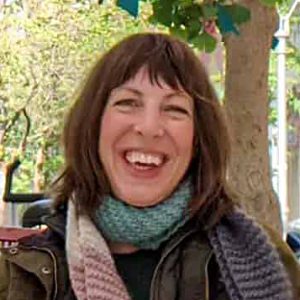By Emma Wallis
At the start of the twentieth century, Gelsenkirchen was the most important coal mining town in Europe. Dubbed the “city of 1000 fires”, it pulled in Europeans from across the continent, eager to work in the town’s booming industries. People came from Poland, Spain, Portugal, Italy and Turkey in particular and stayed. Many of the town’s current residents bear traces of that migration in their surnames today. But ask locals what they think of Europe and the EU and many of them are nonplussed.
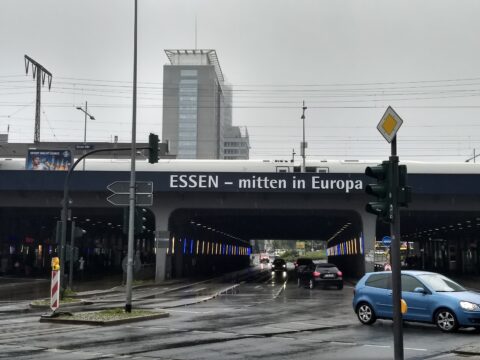
Today, the coal industry has been closed down and the city has become famous for Germany’s largest solar power plant and a very high unemployment rate. Poverty is palpable from the moment you walk out of the station and onward through the town centre. Adults and children are present even during the week all day, when you might expect them to be at school or work. There aren’t many pan-European chain stores along the route; instead discounters and small no-name shops dot the high street. Most people we stopped to ask their opinion of Europe and the EU shook their heads and hurried on. Almost everyone who did stop was originally from another European country or Turkey. Some had been in the city just a few years, others for over forty years. Only one older woman and one younger man, who were actually born in Germany, had time to talk. “Calm, no terror, it looks after you, everyone is equal,” says one older Turkish gentleman when asked what he expects from Europe. “Europe unites us,” nods a younger German man. “I feel European, even if, I was born in Germany,” he adds.
What do you think of Europe and the EU?
“Europe is good for travelling,” thinks an even younger boy, indicating that diversity is what attracts him to the ideas behind the EU. When asked what they thought of Europe, the majority of the people we spoke to seemed to think that Europe needed to stop the free flow of movement; even those who had obviously benefited from that policy by migrating to Gelsenkirchen from elsewhere. Now that they were in Germany and building their lives, they didn’t seem keen on leaving the way open for others to follow. For the older generation, peace was something worthwhile that Europe has provided. For the younger, the freedom to move and live and work abroad was important, nevertheless, controls should be maintained they thought and sharing the wealth across European states would also be a good idea thought many, who noted that today’s Europe has very big inequalities. At the end of February, the European elections still seemed a world away. Even in Germany where the EU tends to be seen as a largely positive force, people didn’t seem very conscious of who they might vote for, or what those candidates could do for them, if elected.
Being green in the Ruhrpott
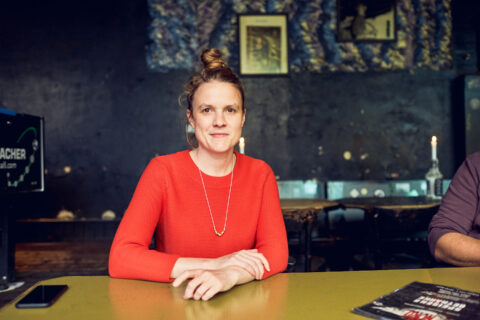
One of those elected back in 2014 is Green MEP Terry Reintke. Currently one of 96 German MEPs in the European parliament and one of several Greens from the most populous region in Germany, NRW. “I could talk about [the importance of Europe] for an hour,” giggles Reintke, her eyes sparking with enthusiasm. “Europe has always played a part in my life. Even though I don’t come from a very international family […] [I did] my Erasmus year in the UK, in Edinburgh. I had the chance to travel to a lot of different places in Europe with Erasmus. It was always part of my identity to be European.” Reintke is Gelsenkirchen born and bred. But she doesn’t see her love of Europe as separate from her regional identity. On the contrary. “I feel that the Ruhr area really is at the heart of Europe. Obviously geographically, but also because there have always been so many immigrants from all over Europe coming to this area. I always felt we are already diverse and international and European, so growing up here, I naturally became European.” This “strong European conviction,” was what propelled Reintke into European politics, and her conviction since she was elected has just become stronger, she explains. “In the past five years since I was elected, [my conviction] has become even stronger, especially following Brexit. I have seen again how important it is to protect these, sometimes very obvious things, like peace and freedom.” Today, Gelsenkirchen has quite large populations of other Europeans. Bulgarians and Romanians (including substantial communities of Sinti and Roma) make up the largest populations from geographical Europe in the town, followed by Polish, Croatians, Italians, Serbians and Kosovans.
Brexit on my mind
Brexit is of huge concern to Reintke and many others in the European parliament too. Not just because of their strong European convictions and personal connections to the UK, as the director of the Europe Direct Office in Essen, Petra Thetard, explains: If and when the UK leaves Europe there will be less money coming in for everyone who is left. This could have a huge effect on regions like the Ruhr area which have benefited from large amounts of European funding in order to pull their failing industries into the 21stcentury and clean up the effects that for example coal mining left behind. Between 2015 and 2018, Reintke writes on her website, more than 420 million euros were poured into the EFRE-NRW project. The money comes from European regional development funds. On the project’s website, they promise that by 2020 4,24 billion euros will have benefited the region overall, 50 percent of those funds come from the EU. The fund finances economic development projects and social enterprises; it supports small and medium businesses and lays money aside to clean up the damage done by polluting industries, to help the region meet the CO2targets laid out for it by national and international plans. It is pushing innovation, technological development and research and it hopes to breathe new life into cities all across the Ruhrpott, including Gelsenkirchen.
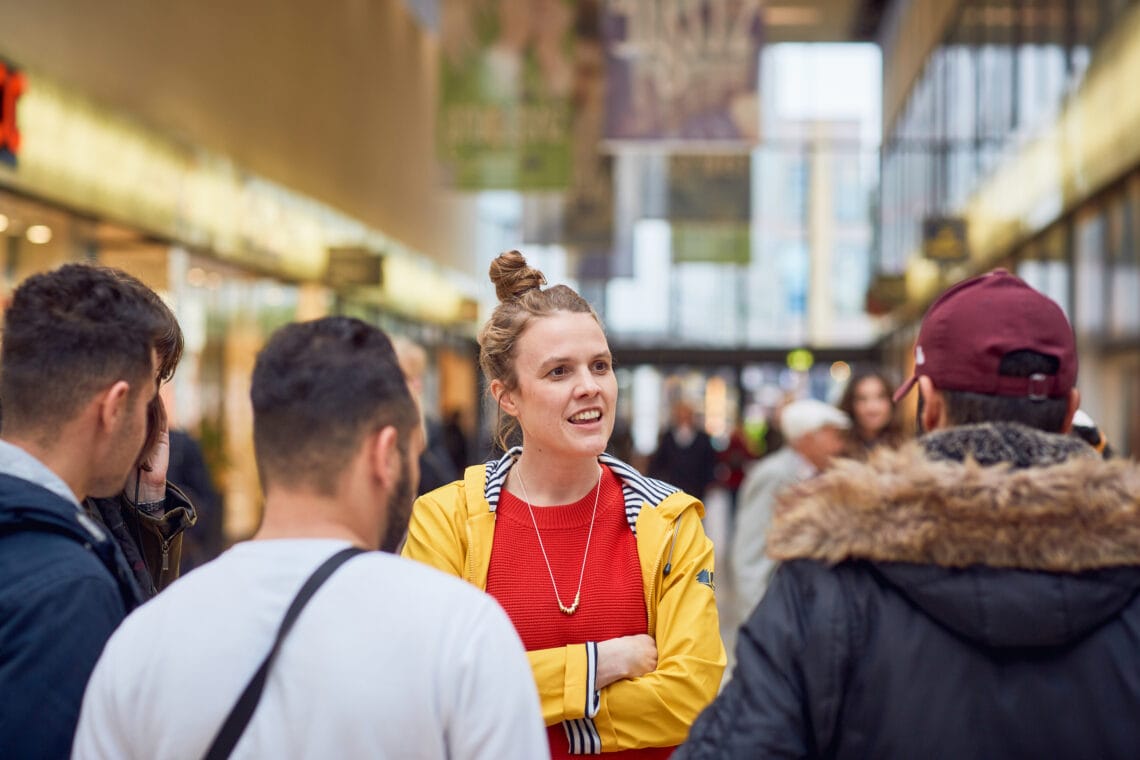
The town’s own website tells its citizens the importance of Europe to the region. It lists the science park, the development of new areas of town like Graf Bismarck, a former industrial area, the Nordstern park, and numerous educational and skills programmes as examples of what the EU has provided. The environment and sustainability are two of the big themes for the European administrators of funds, of which 70 percent go to regions across Europe, such as Gelsenkirchen. A local council which has a European vision is good for Europe and it is good for the locality, explains the town’s video . Their European administrator is the link between local interests, the city’s mayor and Brussels. Their network, made up of partner cities, organisations and institutions, but most of all, people, is of the utmost importance. As the European motto goes, there is strength in diversity, and that strength comes from linking that diversity for a greater good.
What has the EU done for me?
Just ahead of the European elections, Terry Reintke is touring the towns near where she grew up – Essen , Gelsenkirchen, Bochum, Dortmund, Duisburg – in the hope of talking to citizens about why they need to care about Europe and why the EU cares about them. “I think here in the region, as a former coal mining area, with a lot of challenges when it comes to industrial changes, the European Union has played a very important role in facilitating these changes. Now we invest in renewable energies, we invest in digitalisation. There have been 100s of millions of euros invested here over the years and that plays a crucial role in making the lives of the people in the region better.” That said, Reintke realises that not many people will really notice that the benefits come from the EU. She thinks that the EU projects which back these programmes don’t always sing their own praises enough. Many of these programmes are called “regional programmes” she agrees and the ordinary people just don’t realise who is behind them. That needs to change in the future, she thinks.
Europe for the regions
In Brussels and Strasbourg, she works on regional and social issues. She tries hard to speak in a clear and simple language so that everyone really understands “what that means in their everyday lives.” She advises everyone goes to see these projects to really understand what the EU is doing so that its role is “tangible and visible” to people. Despite the “indifference” Reintke has encountered in the past, she sees that people are becoming more fired up and more interested in the EU today. She thinks that, ironically perhaps, Brexit has galvanised a lot of people to “stand up for the European reunification project, […] there is a very big shift in attitudes and in how people get engaged with the European Union [today].” Today, a growing number of citizens want to discuss Europe, even if that means talking about the problems they have with it. But they are engaged and they want to be part of it and work towards making it a better place, thinks Reintke. Which is exactly what she herself is trying to do.
Europe on the football field
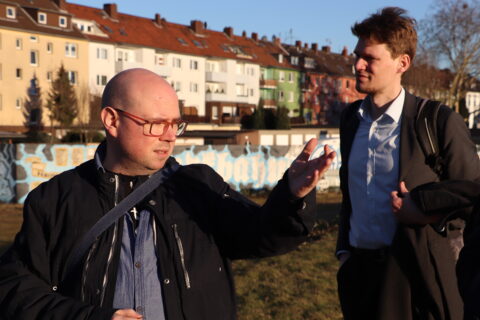
Europe as part of the everyday life in Gelsenkirchen, even if many people in the city might not be aware of it, can also be witnessed at the town’s football club, Schalke 04. Maciej Seweryn, known as Mac “because my name is too complicated for most people;” came from Poland to Germany in 2007. First to study in Magdeburg and then on to Gelsenkirchen. He is a big supporter of Schalke and takes us around the Schalke mile on our visit to the town. He talks about the links to European clubs. Schalke fans have a special relationship with Twente Enschede from the Netherlands, Vardar Skopje in Macedonia, US Salernitana from Southern Italy and FC Nürnberg from Germany. Another Schalke fan, Martina, who is herself active with the Green party, thinks that this football network is useful for Europe. “Building these kinds of civil society networks, making personal contacts and friendships are the cement of Europe and its people,” she explains.
Looking to the future
Today, Gelsenkirchen and the whole region are being forced to look to the future and Europe could provide their key. At the end of 2018 the last coal mines in the region closed down. Young Essen native Nina Kiedrowicz and two friends, Sarah and Anna, who moved to the Ruhrpott for university, are keen to sing the praises of the region where they live. They all admit that, whilst the image of the Ruhrpott might be coal, smoke and industry, the reality is very different. “It’s quite green and nice and fun,” they agree. And much of those environmental changes have been paid for with European money.
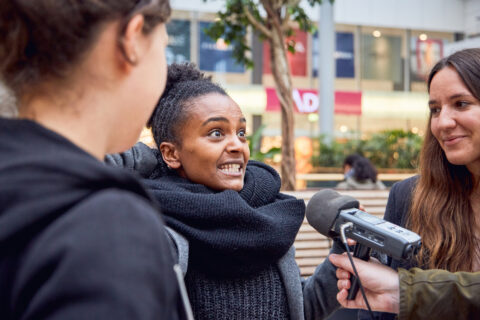
In Essen, Nina explains that both her grandparents were miners and that the older generation are still feeling nostalgic about the past. Even though she says she is ecologically aware and supports the end of coal, she thinks changing the mentality of the majority in the region will take decades. This could be an opportunity for Europe but it depends how it is sold to the people in the region. At the moment they might be more likely to think that Europe is associated with closing down their area rather than opening it up. But there is hope. “I think there is a big void which needs to be filled,” explains Nina, “culturally and mentally and the area needs to reinvent itself. I am not sure what it will be but I am positive about it.” All three women, think that the high unemployment rate and the lack of opportunities has given energy to young people and more and more start-ups and creative ways of thinking abound in this area. “I see a lot of willpower to make something nice [out of this industrial past] and people are really engaging with their local area, there is a power for change here” says Nina. Sarah agrees, “you are forced, if you live here, to change and come up with new ideas. It is really exciting. ” These changes, coming from Europe are already being made in Essen. The city buzzes with energy and money. On the train bridge above the central station it proclaims it is “at the heart of Europe.” There might be more gloss on show in Essen but the cultures and histories of the communities which inhabit the Ruhrpott are broadly similar. Perhaps then, Essen will pave the way for its smaller neighbour, Gelsenkirchen, to follow suit in the future and start to see the European Union as positively as the city’s ‘daughter’ Terry Reintke already does. Emma Wallis was born in London and lives now in Germany where she works as a freelance journalist. She is member of the „Wir sind Europa!“-Basisgruppe.
